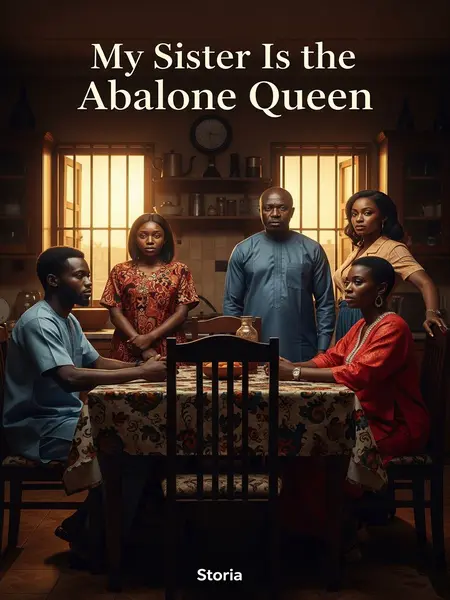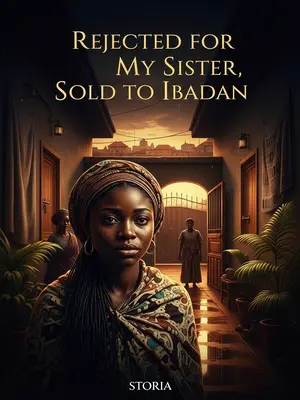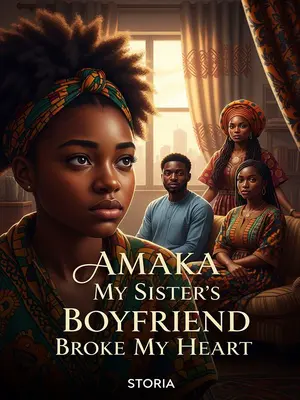Chapter 2: Village People Enter City
For my final year for university, my parents—wey dey farm for village since—just suddenly decide to move come city, say dem wan find work.
The news shock me small because dem be old breed for farm work. You know say for village, na people wey their hand dey strong dey farm, but city matter dey different.
Before I fit even ask why, my parents don carry my sister join body, the three of them just show for my side, drive that our old truck wey we dey use carry grain. Dem wear farm cloth, dust still dey their slippers, but dem waka like say dem own the street.
Dem enter with noise, like market day. Even the truck get dust from farm road, still dey smell like dried yam, but dem no send.
Dem say dem wan open seafood restaurant near my school.
I just stare dem, mouth open. I dey reason how dem wan carry farm sense enter city market where everybody dey chase soft life.
As I hear am, I quickly shake head, try beg them:
“Our family dey inside bush—seafood no even dey our area. How una wan take cook am?”
The way I talk am, my voice get that fear wey dey come when you know say wahala wan land. Even Mama just dey nod for back like say she sef no sure.
Dad just look me with big eye: “Wetin you sabi? Your papa fit get wetin nobody fit get. People go dey queue for our food.”
He talk am with that proud voice, the one wey dey make you fear argue. I just keep quiet, dey look as he dey carry shoulder like chief for town hall meeting.
I just weak: “You just reach here—where you wan see better seafood? Na only few people dey supply correct one.”
I add, “This city no be like our side, Papa. Dem no dey chop anyhow, e get where dem dey buy their thing.”
“All right, e don do. You go understand later.”
E talk am with that final tone wey mean say make I close mouth. Na that kind talk wey if you try argue, dem go vex.
Dad just do like say na big secret, rush go find shop to rent, talk say dem wan open the next day.
E even carry notebook, dey jot something, dey measure window and door like person wey don plan this thing long time.
I try talk sense into them, but dem no gree—the seafood restaurant still open.
As dem set the signboard, people for area dey look us like say we be another family wey no sabi city wahala. But Dad just dey smile, dey polish table.
I no expect say the restaurant wey I no believe go last, but e shock me—e come dey blow, people dey queue every day.
Even my friends begin dey tease me for campus, say na my papa be new don for abalone business.
My papa wey never see sea before, just dey handle seafood like say na him born am.
He dey turn the abalone for pot like professional, even dey yab me say, “You no sabi this thing, na wetin dey sweet men be this.”
Especially the main dish: steamed abalone. E come be talk of the town.
All the Alhajis and local big boys dey rush am. Women dey look with one kain eye, but na only men dem dey serve.
The taste mad so tey people from other states go drive ten hours just to chop am.
I hear say one man drive from Onitsha come chop am, take video put for Instagram, dey shout, “Na this abalone dey make man stand!”
But Dad’s abalone no dey always dey. First, na only men fit chop am—women no dey allowed. Second, e no dey every day; na only first and fifteenth of each month, and even that one, na small quantity.
People go dey calculate abalone days like dem dey count Sallah or New Yam Festival. If you miss am, na to wait another two weeks.
When I understand how Dad dey run the abalone matter, I surprise:
“Dad, you no too go school, but you sabi this scarcity thing well. Limited time, small quantity abalone dey make people want am die.”
I dey look am like say na him be Igbo businessman for Lagos market. Papa just raise eyebrow, no talk.
Dad just look my sister with one kain eye: “I no sabi any marketing. Na because your sister no too get power—na only small she fit produce.”
He talk am like say na normal thing, but the way he look her get one kind weight.
I look my sister, confused.
Her face red, she press her hand for her belle, beg Dad: “Papa, abeg, e too much for me. Make we sell small, abeg.”
I try touch her forehead, but she flinch, whisper, 'No touch me, abeg.' Tears dey shine for her eye. She dey sweat for air-condition room. E be like say she dey carry heavy load for body.
I just dey look her anyhow. Since we move come city, she don dey act strange.
She dey lost for thought, and sometimes her body go just dey smell like fish.
If you pass her room, the smell fit make you think say fish pond dey inside. Sometimes her eye dey red as if she cry overnight.
“No talk that one again. If you produce small, how I go make money? I suffer raise you—no come forget say you suppose pay back.”
Papa voice get that hard edge. Mama just dey clean hand for wrapper, dey avoid everybody eye.
As Dad no gree, my sister no talk again. She cover her face, run comot dey cry.
Her cry no be that one wey dey fade quick—e dey last. Even Mama just dey shout, “Nne, come back o!”
“Dad, wetin dey really happen?”
I dey look Papa face, dey hope say he go soften, but na stone.
“You go understand when you marry.” Dad just shift eye, no gree look me well.
He just dey rub chin, like person wey dey remember old secret.
But my sister never marry too—so how she take know?
I dey calculate for mind. If na marriage matter, how my sister take dey suffer the abalone wahala?
As I see how Dad dey behave, my curiosity just dey increase.
The thing dey burn me. E be like say secret dey for every corner of our new house.
To find out, I volunteer help for the shop, since I no too get class for final year.
I go tell Mama, "Make I dey around, abeg. I fit help with cash or serve table."
My parents happy—business dey hot, and only three of them dey run up and down.
Even Mama smile reach ear, “God bless you, my pikin. See as help come from where I no expect.”
Dem no gree employ person, na just the three of them dey hustle from morning till night.
Na so e dey be for our family—outsider no dey enter secret place. Even cleaner no dey cross kitchen door.











